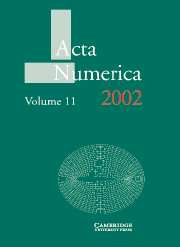Book contents
- Frontmatter
- Contents
- 1 Structured inverse eigenvalue problems
- 2 Subdivision schemes in geometric modelling
- 3 Adjoint methods for PDEs: a posteriori error analysis and postprocessing by duality
- 4 Finite elements in computational electromagnetism
- 5 Splitting methods
- 6 Topological techniques for efficient rigorous computation in dynamics
- 7 The immersed boundary method
- 8 Numerical methods for large eigenvalue problems
5 - Splitting methods
Published online by Cambridge University Press: 21 May 2010
- Frontmatter
- Contents
- 1 Structured inverse eigenvalue problems
- 2 Subdivision schemes in geometric modelling
- 3 Adjoint methods for PDEs: a posteriori error analysis and postprocessing by duality
- 4 Finite elements in computational electromagnetism
- 5 Splitting methods
- 6 Topological techniques for efficient rigorous computation in dynamics
- 7 The immersed boundary method
- 8 Numerical methods for large eigenvalue problems
Summary
I thought that instead of the great number of precepts of which logic is composed, I would have enough with the four following ones, provided that I made a firm and unalterable resolution not to violate them even in a single instance. The first rule was never to accept anything as true unless I recognized it to be certainly and evidently such…. The second was to divide each of the difficulties which I encountered into as many parts as possible, and as might be required for an easier solution.
(Descartes)We survey splitting methods for the numerical integration of ordinary differential equations (ODEs). Splitting methods arise when a vector field can be split into a sum of two or more parts that are each simpler to integrate than the original (in a sense to be made precise). One of the main applications of splitting methods is in geometric integration, that is, the integration of vector fields that possess a certain geometric property (e.g., being Hamiltonian, or divergence-free, or possessing a symmetry or first integral) that one wants to preserve. We first survey the classification of geometric properties of dynamical systems, before considering the theory and applications of splitting in each case. Once a splitting is constructed, the pieces are composed to form the integrator; we discuss the theory of such ‘composition methods’ and summarize the best currently known methods.
- Type
- Chapter
- Information
- Acta Numerica 2002 , pp. 341 - 434Publisher: Cambridge University PressPrint publication year: 2002
- 14
- Cited by



